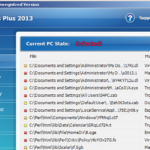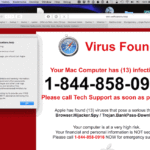Greetings. Today I thought I would go over some basic information about staying safe while you’re online. This post will be geared towards computers running a Windows operating system, but for those of you using Apple computers, remember most of this applies to you too. Fun Fact: One of the earliest viruses around hit Apple computers. All it did was display a poem on the screen. Today, many of the dangers online target all operating systems. We’ll cover a few without getting too technical or going into too much detail.
Malware and viruses
These are programs that attempt to replicate, or copy, themselves on your computer, or to other people’s computer’s from your own. Viruses can be designed to do almost anything the creator of them can imagine. Common examples include stealing Hard Drive storage or Processing power to do the work of the virus maker, spamming e-mail contacts, and even many illegal activities. I don’t mean to scare you, but some viruses can have very serious consequences. I have heard of viruses used by the scum of this planet to store and distribute child pornography. This means that when authorities are investigating and trying to stop this activity, the owner of a computer infected with this virus would come under suspicion and investigation. I cannot think of a better reason to make sure my computer is free from viruses! Sure, I use my credit card online and a virus could enable my card to be stolen, but the thought of someone using MY computer to do something as disgusting as store and share child pornography… EW!!! Please excuse me while I go do a deep virus scan on every computer in my house.
Phishing
Phishing in Internet Security is similar to Fishing in a lake or river. The Phisher uses bait to try and catch their victims. The basics of it are to display a page that looks like the login page of a site you visit and get you to log into the site using your username and password. The site will log those and enable the owner of the site to login into the legitimate site it was copying with YOUR account. This can be used on sites like Facebook, or online mail services all the way up to your banking company or a shopping website. These sites can request you enter your credit card information and if you think you on your Banking companies site or eBay you might not worry about putting in your credit card, but remember, these sites only LOOK like the actual site. The best way to stay safe from Phishing is to make it a habit to check the URL of the page you are on EVERY TIME you enter any passwords, credit card information or other personal information. A Phishing site cannot use the URL of the actual website. For example, I have a bank account with CIBC. CIBC’s web page URL (address) is https://www.cibc.com. So anytime I am putting in my card number and password for my CIBC Banking account I look up at the address bar and make sure that the URL starts with https://www.cibc.com. If it starts with anything else I won’t put in my information. A common tactic phishing websites use is to use a similar looking URL so make sure you look very closely! https://www.clbc.com and https://www.cidc.com may look like https://www.cibc.com at a quick glance, so look carefully before entering your information. Remember, the page may look IDENTICAL to the legitimate page
UPDATE: It has come to my attention recently that a way to bypass the URL has been discovered. The ability is out there now to display whatever is wanted in the URL bar. This means that https://www.cibc.com could very well display in the URL bar of a scam website. This makes it more important than ever to watch out for ‘fishy’ messages in e-mails. Some signs to watch out for include:
- generic greetings instead of personal ones using your name
- spelling mistakes
- math mistakes if there are sales information involved (subtotal doesn’t add up)
- redirects after you click on a link from the e-mail before you get to the end website
It appears that Browser makers are actively patching this vulnerability but in the
mean time we must stay vigilant, and remember that once patched, It will only be a matter of time before a new vulnerability is found.
ScareWare
Scareware is a special term given to anything you might see online that is designed to scare you out of your cash. They are often designed to mimic the look of an actual warning message you might see on your computer. They might look like they come from Windows, Mac OS X or a popular antivirus software. I have even seen one access the computer’s webcam, display it on the screen and claim to be sending a video of you to the FBI. All you had to do to NOT be arrested by the FBI was to pay a fine of $249 to the account listed, and all charges would be lost. This was all fake. That is not how the FBI or any other law-enforcement agency works. However, it spooked the client that brought the computer to me a lot.
- Malware
- Popups
- Fake Virus Warnings
Phone Scams
Microsoft will not phone you. But a common tactic that is used in phone scams, is to phone someone and claim to be from Microsoft. Similar to the ScareWare mentioned above, they will tell you something is wrong with your computer (it has errors, viruses, etc) and then request some information from you about your computer and, usually your credit card information. In some cases, they don’t want your credit card. Why not? Because all they want is the computer information. This information actually gives them remote access to your computer. With this they can do all sorts of malicious activities like spreading viruses, hosting illegal content on your computer, shopping using any saved credit card info you might have or gather data for identity theft.
Never give these callers the information they want. Never turn on any remote access settings for anyone you don’t trust. In my experience, a PC is often already infected to some degree when these phone calls are made (this is why the caller might be able to tell you the serial number of your computer, seemingly legitimizing their claims to be from Microsoft). Often times though, they simply mass call and hope to catch someone with a slow computer. Either way, it is often a good idea to have your computer checked out after getting a phone call like this. I can check if you are already infected, as well as make sure no one has remote access to your computer. If you listened to the caller and did what they asked you to do on your computer, you should monitor your bank and credit card usage very carefully or contact your banking establishment and have a fraud watch added to your account.
I have gone over only the basics of some of the Internet Security downfalls that exist. It should be enough to help you avoid some problems, but the criminals that use these tactics are always coming up with new ways to trick us. It is important to be aware of these tactics as we navigate the world wide web.
- Do you have antivirus protecting your system?
- If you do, are its definitions up to date?
- Is it running scans at times convenient to you?
- Does your Antivirus include Anti-Malware protections?
Y-Not Tech Services offers you a stress-free Antivirus and Antimalware solution that is managed by me. Once installed, you don’t need to worry! I can monitor remotely to make sure it is up to date and scanning on a regular schedule. You don’t need to do anything! You can feel confident knowing that you’re protected by a top of the line program being monitored by an expert. The service even includes free virus and malware removal in case something slips through! Book an Appointment today to get your systems protected for only $19/month/PC (Windows only for now).




